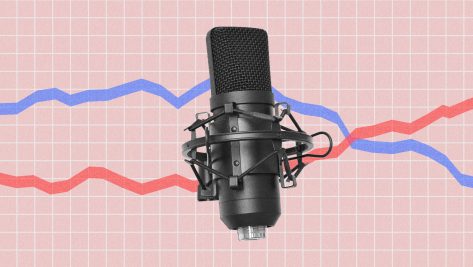After baseball, the great American pastime is the battle of the generations. The national fixation on generational differences is so intense that we name them, argue over the years that delimitate them, and – most of all – we stereotype them. The out-of-touch Silent Generation, the selfish Baby Boomers, the cynical and disaffected Gen-Xers, the entitled and lazy Millennials, and the technology-addicted Gen-Z. Yet, despite the snark, studying generational and other demographic trends helps political strategists build winning campaigns.
As we approach 2024, understanding young Americans’ values – the so-called Millennials and Gen-Z – will be a critical piece of either a Biden or Trump victory. Recent polling shows that these generational voters who supported Biden in 2020 are no longer thrilled with his administration and are taking another look at Trump – to the point of even considering casting their vote for him in the general election.
It may seem like a lot to ask of an octogenarian from the Silent Generation to woo young voters. Past generations have been favored by inspirational candidates closer to their peer group: Baby Boomers had Kennedy, Gen-Xers had Clinton, and the Millennials had Obama. Perhaps Gen Z’s inspirational candidate will emerge in 2028, at a time when they (plus Millennials) will make up the country’s largest voting bloc. But for now, we’re all – young and old – stuck with a déjà vu election.
But let’s remember that U.S. presidential campaigns are all about the big wide voting coalitions. Bernie Sanders did well among young voters despite his age and, in fact, the Millennials and Gen-Zers who could vote in 2020 were a key part of Biden’s victory. According to Catalist, these generations represented 31% of the electorate in 2020, up from 23% in 2016 and just 14% in 2008. More importantly, they turned out to vote at a record rate of 50%, an 11-point improvement over 2016 and what is probably the highest youth turnout since the voting age was reduced from 21 to 18 in 1969. This is significant because the age-old problem of campaigns is getting young people – especially those without university educations – to vote.
In the case of 2020, fear of a second Trump administration was enough to mobilize half of young voters – and they went for Biden by a 20-point margin. Along with women, Black and Latino voters, and the university-educated, it was the youth who were (and are still) a critical part of Biden’s coalition of voters. Looking towards a future with more Gen Z voters, 2020 seemed like the beginning of the end for Trump and his MAGA brethren. Atlantic writer and CNN analyst Ron Brownstein gushed that, “the coming generational backlash against Donald Trump may represent only the first tremor in a much larger earthquake threatening the GOP through the 2020s.”
American youth prefer their country to focus on its problems at home.
But recent polls say otherwise. Young Americans who reliably vote Democratic are not loving Biden. The New York Times/Sienna College poll of swing states came out in early November showing Trump ahead of Biden in five of the six swing states: Arizona, Georgia, Michigan, Nevada, and Pennsylvania. Biden held a lead in Wisconsin. In 2020, he won all these states. Even a year out, losing to Trump by ten points in a diverse state like Nevada is enough to take any Democrat’s breath away. But a one-point loss to Trump among people under 30 is much worse – for Democrats it is the stuff of panic attacks. Then, a late-November NBC News poll revealed that Trump was leading Biden 46% to 42% among voters aged 18 to 34, compared to an earlier poll that showed Biden leading Trump by a similar margin in June and September.
The clearest and most immediate reason why young people are turning away from Biden is his handling of the Israel-Hamas War. This war is hurting Biden’s approval ratings across the board, but it is especially costing him support among young people. A recent Pew report shows that, overall, 41% of Americans disapprove of the Biden Administration’s handling of the conflict, as do 46% of those under 30 years old. But the difference lies in the intensity of this disapproval: 26% of 18 to 29-year-olds “strongly disapprove” compared with 21% of 30 to 49-year-olds, 19% of 50 to 64-year-olds, and only 17% of those 65 and over. Furthermore, an NBC poll found that a whopping 70% of 18 to 34-year-olds disapprove of Biden’s handling of the conflict.
Americans under 30 have a different view on who is to blame. While 62% of Democrats and 73% of Republicans believe that Hamas has “a lot” of responsibility for the current war, that figure falls to 44% of Democrats and 52% of Republicans under 30. While Republicans are more united behind Israel with only 21% seeing Israel as having “a lot” of responsibility while 50% of Democrats are of that opinion. That figure rises to 55% of Democrats under 30. It’s worth noting here that about 20-25% of people across all age groups and ideologies just simply don’t know.
Fifty-two percent of Americans aged 18 to 34 said that they were more sympathetic to Palestinians than Israelis, according to a Quinnipiac University poll from early November. What’s striking – but not entirely surprising – is the sharp reversal from the results of the poll taken just after the October 7 assault, when 41% of young people sympathized with Israelis compared with the 26% who sympathized with Palestinians.
When asked by NBC why he disapproves of Biden’s job performance, Zico Schell, a 23-year-old Democrat from San Diego cited “Failed promises, student loans, foreign policy in general.” This criticism is despite the fact that the administration has done its level best on student loans, offering $132 billion worth of loan forgiveness despite the Supreme Court’s blocking of his student debt cancellation plan. But voting and elections aren’t about the facts, but about emotions and perceptions.
This younger generation is deeply concerned about the climate crisis, and alarmed at the growing lack of reproductive rights in the United States after the Supreme Court overturned Roe vs. Wade last year. They have been traumatized by school shootings and, even if they haven’t experienced a shooting directly, have been subject to shooter drills in their schools. So, it’s not all that surprising that they are less interested than older generations in trying to solve the world’s problems when there are so many to tackle at home. In fact, a Pew Research report on how young people in the U.S., the U.K., France, and Germany want their countries to engage with the world found that while 18–29-year-olds, including those in the US, are the most optimistic that international action can reduce the effects of climate change, American youth prefer their country to focus on its problems at home rather than be active in world affairs.
Trump is loath to engage with the world and thus might very well have an opening with these voters – except that his and his party’s stance is even more firmly behind Israel than the Democrats. (Not to mention the uncertainties in store for him thanks to multiple jury trials in 2024.) So, time is, ironically, on the side of 81-year-old Biden. Plus, a lot can happen in a year as our attention gets diverted from one crisis to the next. Democratic pollster Jeff Horwitt of Hart Research Associates believes that Biden can bring back young voters since “These are people who have a proven track record in voting for Biden and Democrats.”
Finally, there’s the truth that Democrats are never as happy with their presidents as they are with their candidates. Last election, Biden was a “our best bet to beat Trump,” not a “we’re in love with him” candidate. So, even if young people come around to seeing Biden as the least bad choice as the specter of a second Trump presidency becomes clearer, that doesn’t mean they will turn out to vote in the record numbers that they did in 2020. That should be keeping Democrats up at night.
A version of this article also ran in Spanish on esglobal.org.
© IE Insights.











